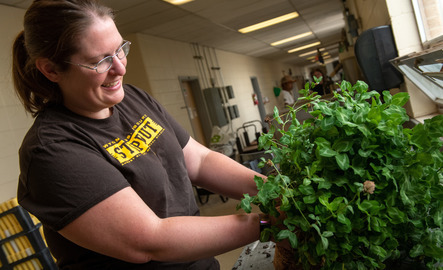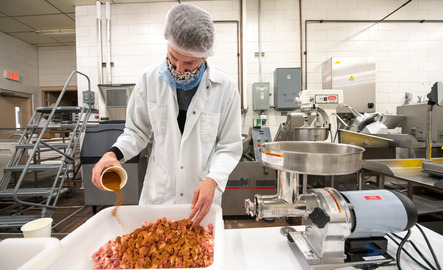What is Food Science and Human Nutrition?
When you apply for the master’s degree program in food science and human nutrition
at UW, you indicate the research experience you want and faculty member you’re interested
in working with. Our graduate program faculty are actively conducting research in
the areas of eating behaviors, indigenous/traditional diets, micronutrient needs and
deficiencies, food product development, sensory characteristics of food products,
health and physical performance of active individuals, nutrition and disease, brain-reward
pathway, microbial diagnostics, rumen microbiome, nitrogen/protein metabolism, lipid
analysis and alternative feed/forages.
As part of a university that has been epically innovative since 1886, we are making
amazing discoveries to impact food production, disease prevention and public health.
The world needs more relentless curiosity. Research experiences in food science and
human nutrition are readily available.

You can earn your master’s degree in food science and human nutrition through the Department of Animal Science or Family and Consumer Sciences. You also have an interdisciplinary program option, which adds a theory component to your laboratory and classroom learning.

What Can You Do With a Food Science and Human Nutrition Master’s Degree?
Graduate students who earn their M.S. in food science and human nutrition find jobs in clinical, community and research settings. They have also been accepted into professional education and doctoral degree programs across the United States in fields such as human medicine and health care.
Human nutrition and food science jobs include research, food product development, quality control, marketing, management, sales, advertising, public relations, regulation, food microbiology, health and wellness, public health and community nutrition, college teaching and extension work. UW graduates from the food science and human nutrition master’s degree program hold titles such as:
- Quality and Product Development Manager
- Research and Development Manager
- Food Industry Consultant
- Director of Food Safety and Assurance
- Nutrition and Regulatory Specialist
- Clinical Dietitian
- Research Assistant Professor
- Chobani
- Nestlé Purina North America
- General Mills
- Glanbia Nutritionals, Inc.
- Abbott Laboratories
- Clear Springs Foods
- Butter Buds
- Air National Guard
- Memphis VA Medical Center
- U.S. Department of Veterans Affairs
- ELITE One Source Nutritional Services
- University of Kentucky
- Watson, Inc.
- Ingredion Incorporated
- Plains All American
Fast-growing careers in nutrition and food science include personalized nutrition, diet consulting and sports nutrition. There’s also rising demand for food safety auditors, R&D scientists and corporate wellness experts. These roles blend health, innovation and sustainability, with strong job growth projected!
Absolutely! If you enter the food science and human nutrition graduate program as a Registered Dietitian (RD)—or pursue an RD after earning your master’s degree—you’ll have even more opportunities for human nutrition and food science jobs in fields such as inpatient care, nutrition counseling and sports nutrition.
Several graduate students in the food science and human nutrition master’s degree program at UW have been awarded the Ellbogen Outstanding GA Teaching Award for their involvement with teaching. You’ll have a variety of opportunities to gain college teaching experience through undergraduate classes, which can lead to a certificate in college teaching through UW’s Center for Teaching and Learning.


